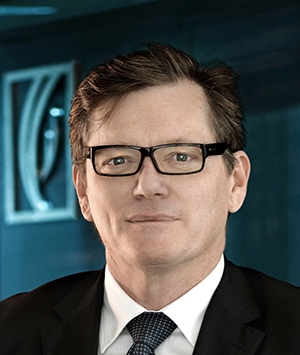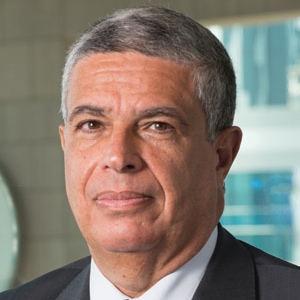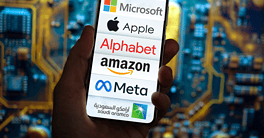Capital markets step in to fill the funding void as government support for corporate players wanes.
The investment-grade corporations in the GCC have remained fairly resilient since the 2014 oil price shock, mainly because most are state-owned entities in strong competitive positions. These companies will soon be forced to tap debt and equity capital markets, however, as government support dries up amid ongoing structural reforms.
“GCC governments have done fairly well in balancing reform implementation while preventing a systemic shock in the corporate sector,” says Rehan Akbar, vice president and senior analyst in the corporate finance group at Moody’s Investors Service Middle East in Dubai. “We think GCC nonfinancial corporations in mature and capital-intensive sectors, such as oil and gas, refining and petrochemicals, utilities, real estate, and infrastructure, are likely to increasingly access the capital markets during the next five years or so.”
Massive borrowing by GCC sovereigns in the international bond markets in recent years has created a yield curve, which can serve as a benchmark for corporate debt issuance in the region. With the encouragement of fiscally challenged governments, GCC companies are diversifying their funding sources and tapping the debt markets for capital.
In November 2017, Abu Dhabi Crude Oil Pipeline issued $3 billion of 30-year project bonds, which attracted more than $11 billion in orders. “This transaction opens the door for other GCC national oil companies to leverage their mature oil and gas infrastructure to access long-term funding through the international debt markets,” Akbar says. Aircraft leasing company Dubai Aerospace Enterprise issued $2.3 billion in bonds last July.

Nelson, Emirates NBD: Recent constraints on government budgets have seen large corporates relying more on syndicated loans from international banks. |
Mazin Saad Al-Nahedh, group CEO of Kuwait Finance House (KFH), says the issuance of sovereign bonds in global markets aims to avoid competition with the private sector in obtaining credit. “Yet the issuance of these bonds in local markets would contribute to the enhancement and development of debt capital markets gradually,” he says. KFH Capital does not deal in bonds, but it is a major participant in Islamic finance and sukuk.
In total, government and corporate bond issuance in Kuwait more than doubled in 2017 to $16.8 billion. The government not only continued to issue domestic debt but also tapped the international capital market for an $8 billion sovereign issue. “Our financial system is bank-centric, with banks playing a major role in financial intermediation,” says Mohammad Al-Hashel, governor of the Central Bank of Kuwait. “However, the government has taken measures in recent years to promote greater use of corporate debt.”
“Many Kuwaiti banks also issued Basel III-compliant bonds and sukuk to enhance their capital base,” he continues. “For its part, the Capital Markets Authority has been streamlining its regulations and internal procedures for debt and equity offerings.”
Shayne Nelson, group CEO of Emirates NBD, says: “Corporates in the UAE are certainly making more use of debt capital markets now than a decade ago. However, growth in corporate debt issuance has lagged the growth in issuance from the sovereign and financial sectors. Most large corporates are government owned and historically have had access to funding from the government. However, recent constraints on government budgets have seen these companies relying more on syndicated loans from international banks as well as tapping the international debt capital markets.”
The absence of a dirham-denominated debt market limits the possibility of debt issues from small to medium-sized companies, which continue to rely on bank loans, Nelson says. “In the dollar-denominated space, corporate debt issuance continues at a healthy pace,” he adds.
The corporate bond market is still at its early stages in the region, and companies are primarily dependent on bank debt, says Adel El-Labban, group CEO of Ahli United Bank in Kuwait. “Only very large quasi-government corporations currently access the corporate bond market with any regularity,” he says. “The development of large corporate entities and the broader implementation of a rating culture are needed to promote this market.”

El-Labban, Ahli United Bank: Only very large quasi-government corporations currently access the corporate bond market with any regularity. |
With increased private sector participation in the economy, the funding needs of Bahrain companies are expected to increase. “In the future, corporates may turn to bonds, sukuk and IPOs as a cost-effective means of funding their expansion plans under the right market conditions,” El-Labban says.
Similarly, in Qatar, “We have seen increasing interest from corporate [entities] looking to diversify their sources of funding at competitive costs and tap the debt capital markets,” says Ali Ahmed Al Kuwari, group CEO of Qatar National Bank. “This is in line with the government’s strategy to ensure that there is a diversification of funding sources for key entities.” Given the evolution of the debt capital markets in Qatar and the establishment of the yield curve across various maturities, “it is the right time for corporate issuers from Qatar to become more active in debt capital markets,” Al Kuwari says.
QNB Capital is advising a number of entities on strategy for their inaugural issuance, including obtaining credit ratings. The investment bank is also advising a few public- and private-sector clients with their planned IPOs, Al Kuwari says.
GCC governments are helping to develop more active equity markets through privatizations. According to Saudi Arabia’s Vision 2030: “The ongoing privatization of state-owned assets, including leading companies, property and other assets, will bring in new and more diverse revenues for the Saudi government. This will further enhance our financial resources and economic stability, which will be reinvested for long-term impact. We will develop further the sophistication of our investment vehicles, particularly after transferring the ownership of Aramco to the Public Investment Fund, which will become the largest sovereign wealth fund in the world.”
Saudi Arabia has been revising its stock market rules and regulations to prepare for the Aramco IPO, which could be as large as $100 billion for a 5% stake in the company. Most recently, the Saudi Capital Markets Authority (CMA) developed a price stabilization measure to guard against a large share-price drop in newly listed companies. By early next year, the CMA is expected to release comment rules for governing dual listings on the Saudi stock Tadawul and other exchanges.
Saudi Energy Minister Khalid Al-Falih, who serves as Aramco’s chairman, said earlier this year that the oil company’s IPO would be anchored by a listing on Tadawul, with a potential international listing to follow.
Index compiler MSCI’s decision to reclassify Saudi Arabia next June as an emerging market could lead to foreign portfolio inflows of about $45 billion, according to Capital Economics. Listings on regional exchanges already have increased.
In December 2017, Abu Dhabi National Oil raised $851 million by listing a 10% stake in its service station subsidiary—the Abu Dhabi exchange’s biggest IPO in a decade. Emirates Global Aluminium is planning an IPO for as much as $3 billion, with a dual listing in Abu Dhabi and Dubai. Saudi Arabia’s ACWA Power plans a $1 billion listing by the end of this year, and the Kuwait Stock Exchange is preparing for a listing of its own shares in the first quarter of 2019.
Meanwhile, Nasdaq Dubai is preparing to offer equity futures on leading companies listed in Saudi Arabia. “The futures will give investors new hedging tools to take long and short positions on the companies, at a time when international investor interest in the Saudi stock market is increasing rapidly,” the exchange said in a statement. Derivatives trading on Tadawul could begin next year.



